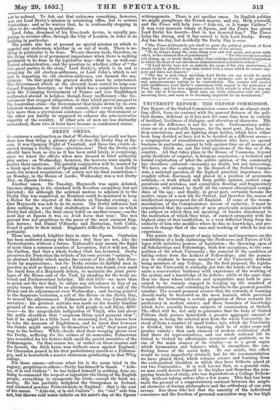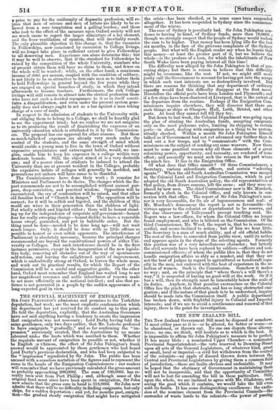UNIVERSITY lifiFORM : THE OXFORD COMMISSION. THE Report of the
Oxford Commission comes with an almost start- ling effect, from its contrast with the general flatness of the poli- tical drama, deficient as it has now for some time been in variety of incident, liveliness of dialogue, and elevation of character. The cause of the difference is not far to seek. Parliamentary politi- cians are at a stand-still, because, for the most part, they have no deep convictions and are fighting sham battles, which have either been long decided or have yet to be decided on a different arena- s congregation of miscellaneous gentlemen who have no special business in particular, except to talk against time on all manner of questions, which are not the vital questions of the day or of the country. All that takes place in the House of Commons, beyond petty incidents of surprise foregone conclusion—a technical and formal registration of what i the public opinion of the community has elsewhere enforced—necessary no doubt, but not interesting. We have, on the contrary, in the Report of the Oxford Commis- sion, a national question of the highest practical importance tho- roughly sifted, discussed, and placed in a position of proximate solution,—a work which will form public opinion, correct exag- gerations and mistakes' and consolidate floating and fragmentary schemes ; will attract to itself all the earnest educational sympa- thies of the age; and finally, in great part, certainly become the motive cause of a new life for Oxford, and therefore the source of intellectual improvement for all England. If some of the recom- mendations of the Commissioners savour of audacity, it must be remembered that the audacity of men practically acquainted with the subject on which they are speaking, of known attachment to the institution of which they treat, of earnest sympathy with the highest aims of that institution, is a very different thing from the audacity of him who meddles where he has no knowledge, and pre- sumes to change that of the uses and working of which he has no experience. The points in the Report of main interest and importance are the constitution of a body embracing the Professors and Tutors of Col- leges with initiative powers of legislation ; the throwing open of all Scholarships and Fellowships, with few exceptions, to the com- petition of the whole University ; the removal of the condition of taking orders from the holders of Fellowships ; and the permis- sion to students to become members of the University without being members of any iCollege. By the first proposal, the legisla- tion of the University s virtually put into the hands of those who unite a conservative tendency with experience of the working of the system and a knowledge of its defects; while at the same time they are those whose interests and sympathies may both be pre- sumed to be warmly engaged in keeping up the standard. of Oxford education, and extending its benefits to the greatest possible number. The second proposal secures that the rewards of learning should really be bestowed on the most learned, while provision is made for bestowing a certain proportion of those rewards for proficiency in modern science and those branches of knowledge which have recently become subjects of examination at Oxford. The effect will be, not only to guarantee that the body of Oxford Fellows shall possess henceforth a greater aggregate amount of
learning, as being the selected men from the whole University, in- stead of from a number of small bodies into which the University is divided, but that this learning shall be of wider scope and greater variety ; that each element of modern civilization shall find there its representatives, and our whole national life be linked to Oxford by affectionate reverence and gratitude, as to one of the main sources of its vitality—as to a great organ which harmonizes and balances while it strengthens the con-
flicting forces of the social body.. To our minds, this effect
would be very imperfectly attained, but for the recommendation we have placed third, which releases science and learning from the ecclesiastical thraldom in which they have hitherto pined at our two Universities. It is well known that, as a general rule, no man could devote himself to the higher and therefore the non- paying branches of study, who was dependent on a College Fellow- ship, without taking orders after a few years. This fact has been made the ground of a congratulatory contrast between the scepti- cal character of foreign philosophers and the orthodoxy of our own. sevens. But those who feel that the sanctity of the individual conscience and the freedom of personal conviction may be too high
a price to pay for the uniformity of dogmatic profession, will re- joice that men of science and men of letters are likely to be re- lieved from a sore temptation and a galling burden ; and those who look to the effect of the measure upon Oxford society will not see much cause to regret the larger admixture of a lay element, and the freer ventilation of opinion, that will inevitably result. The only plausible objection to this change is, that the vacancies in Fellowships, now occasioned by succession to College livings, will no longer take place in sufficient extent to give Fellowships to all deserving men. Experience can alone determine this; but it mar be well to observe, that if the standard for Fellowships be raised by the competition of the whole University, numbers who at present obtain them will have no claim to them, and fewer on the whole will be wanted ; while, on the other hand, a maximum Income of 300/. per annum, coupled with the condition of celibacy, is not likely to be so attractive to first-rate men as to induce them to hold Fellowships in general beyond the few years while they are engaged on special branches of study, in which they intend afterwards to become teachers. Furthermore, the rich College livings will still remain to attract into the clerical profession those who have not such a decided repugnance to it as in itself consti- tutes a disqualification, and even under the present system gene- rally does and always ought to act as a bar against a man taking charge of a cure of souls.
In respect to the admission of students to the University with- out obliging them to belong to a College, we shall be heartily glad to see the experiment tried; but we confess we are not sanguine as to its producing the result of diminishing the expenses of an university education which is attributed to it by the Commission- ers. The proposal has our approval for other reasons. But these so-much-talked-of expenses are already very much under the control of the students, and the same strength of mind which would enable a young man to live in the town of Oxford without expensive acquaintance and extravagant habits, would, we ima- gine, enable him to keep his expenses in a college within very moderate bounds. Still, the object aimed at is a very desirable one; and if a poorer class of students be induced to attend the University than are at present resident in the Colleges, probably the expensive habits of oolleges will generally be modified, and generations yet unborn will have cause to be thankful.
The Commissioners have done their work ; it remains for Ministers and Parliament to do theirs. The changes which the Re- port recommends are not to be accomplished without earnest pur- pose, deep conviction, and practical wisdom. Opposition will be encountered, the cry of confiscation will be raised, and that other old familiar howl of "Church in danger." The opposition will be earnest; for it will be selfish and bigoted, and the children of this world are wiser in their generation than the children of light. Not wholly selfish and bigoted either ; there will be honest stand- ing up for the independence of corporate self-government--honest fear for really sweeping change—honest dislike to have a venerable house swept, garnished, and put in habitable order. But the thing must be done—needed to be done long ago—will not wait much longer. Only, it should be done with as little offence as possible to honest or even selfish opponents. The interference of Parliament is absolutely necessary, because the principal changes recommended are beyond the constitutional powers of either Uni- versity or Colleges. But such interference should be in the first instance permissive, except in the inauguration of the new legisla- tive body, removing all obstacles out of the way of spontaneous self-reform, and leaving the enlightened spirit of improvement, which is undoubtedly strong at Oxford, to leaven the whole mass, and work out its practical results, for which the Report of the Commission will be a useful and suggestive guide. On the other hand, Oxford must remember that England has waited long to see her magnificent revenues and noble inheritance of renown made to act more efficiently on the national intellect; and also that pa- tience is not generated in a people by the sudden appearance of a long-expected goal in view.



























 Previous page
Previous page